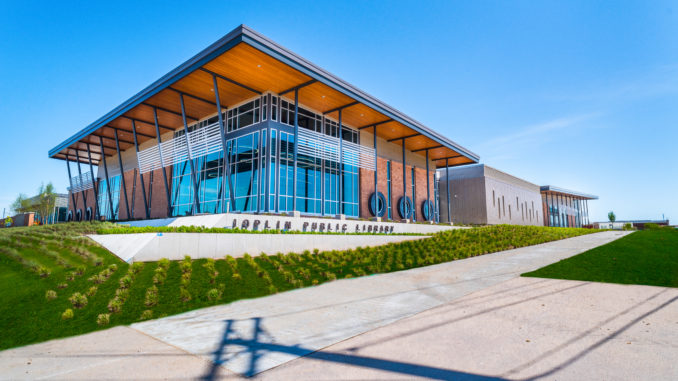
Joplin Public Library (JPL) has a full month of programming and events lined up for February! A few of them include:
- Tuesday Knight Chess Club (February 6)
- Black History Fair (February 10)
- Yoga Class (February 13)
- Preschool Music Morning (February 26)
Please note that the Library will be closed on February 19 for Presidents’ Day. View JPL’s online calendar to see a full list of their events, and read highlights from their newsletter below.
Resource Spotlight: Creativebug
Creativebug is your go-to resource for high-quality, on-trend arts and crafts instructional videos, and it’s accessible through your Joplin Public Library card!
By signing up for Creativebug, you’ll enjoy unlimited access to thousands of online arts and craft classes. Watch the classes anytime, anywhere. Since the classes never expire, you can start and stop projects at your own pace, too. No pressure, just possibilities!
Check it out here.
Black History Fair
You’re invited to the Library’s annual, all-ages Black History Fair on Saturday, February 10! The program will take place form 11:00 am to 1:00 pm with a special storytelling presentation by Janice Katambwa (“Mama Katambwa”) from 11:15 am to 12:00 pm. Booths will be set up before and after the presentation to visit!
Other fun activities include:
- Children’s craft table
- All-ages book displays
- Local author visit
- Community organizations
From the Post Reading Room
Snippets from Joplin’s Black History
In 2012, former Post Art Library Director Leslie Simpson wrote, “The Black History of Joplin has yet to be written.” Now, over ten years later, this statement still rings true — not much has been published about Joplin’s Black History. As such, the Post Art Library is working to collect information, conduct research, and provide resources with which that history could be written. Also, the current Post Art Library Director, Jill Halbach, is working on a Black History chapter, which will be included in an upcoming local history book that is to be released in late 2025 or early 2026.
It’s common knowledge that early-day Black people residing in this area were slaves belonging to the first white settlers. John Cox, the found of Joplin City (1871), owned three slaves, one of whom is among the men credited with discovering lead in the area. It’s thought his slave’s name was Pete, but, sadly, no one knows for sure. Slaves were most often documented as property rather than people. When slaves’ names are included in historic records, it may be their first names only or their owners’ surnames, such as is often the case with county probate records or deed transfers. This lack of personal detail makes it challenging to trace early-day Black History, both in general and in Joplin.
Black History is among the Post Art Library’s areas of concentration in further developing their local history files. Newspaper clippings make up the bulk of what they have, though they have a few oral histories, interviews, limited photographs, and other documentation that has been shared by members of Joplin’s local Black community. Below are five summaries of some of the information from the Post Art Library’s files. By no means are these writings comprehensive, exhaustive, or fully representative of Joplin’s Black History or the local Black community. They are, however, a starting point for discovering, collecting, publishing, and sharing local Black history so that we as a community may better tell the full story of Joplin.
- Black Newspapers: Historically, Joplin is home to three Black newspapers: The Joplin Advance, the Afro-American Leader, and the Joplin Uplift. The Advance was published by W.L. Yancey in May 1895; the Post Art Library knows of only one (digitized) issue. According to local Black history historians, the Afro-American Leader was published by Charles Cuther around 1917; the Post Art Library does not know of any surviving issues. The Joplin Uplift was published by Augustus and Fannie Tutt in the late 1920s/early 1930s; the Post Art Library knows of four surviving issues, which are part of a local, personal collection.
- Emancipation Celebration: Since the 1800s, Joplin’s Black community has hosted an Emancipation Celebration. It’s unclear as to why, exactly, it’s held in August, but common claims among locals say that’s when the news of emancipation arrived in this area (due to news traveling slowly in those days). Today, the celebration, called Park Days, is held annually in Ewert Park. It’s Joplin’s longest-running community event.
- Ewert Park: In 1924, the acreage that became Ewert Park was donated to the City of Joplin by Paul A. Ewert and his wife Sydney to be developed as a recreational area for the local Black community. It was equipped with a swimming pool and concession house, a shelter, dance pavilion, and children’s playground. This was the first, and until desegregation the only, city park where Black people were permitted.
- Lincoln School: A former school of the Joplin R-8 School District, Lincoln School served Joplin’s Black community for 65 years. Initially opened elsewhere in 1890, and having moved one other time, Lincoln School’s final move was in 190, to a handsome red brick building that once stood on East 7th Street (near where Unity Baptist Church stands today). By 1950, the school was enlarged and remodeled. Lincoln School was Joplin’s only school for Black students, serving not only Joplin, but neighboring towns. Following integration, the school was used for special education until its closure in 1975. It was razed in 1988.
- Parkway Cemetery: In 1932, a committee of Joplin’s Colored Citizens’ Club requested that a portion of the city’s newly considered cemetery track be developed exclusively for Joplin’s Black citizens. In 1933, plans were announced and work began to clear the east side of McClelland Park Road for such use. Later that same year, city commissioners officially named the tract Parkway Cemetery, thus establishing the city’s second municipal cemetery. In addition to serving as a burial ground for Joplin’s Black citizens, Parkway Cemetery historically served as a gathering place for Black families during a time when Black people had very few options. Parkway Cemetery has been in continuous use since 1933.
A big thanks to colleagues past and present, as well as to the organizations and people who’ve contributed to local Black history files, especially Ms. Betty Jean Reaves Smith, who graciously answers the many questions that the Post Art Library has. If you’d like to contribute to local history files, then please contact Jill Halbach at 417.623.7953, ext. 1041 or jill@postartlibrary.org.
About Joplin Public Library:
Since 1902, JPL has been fulfilling the information needs of citizens of Joplin and the surrounding community. JPL opens tomorrow’s doors today through diverse opportunities to learn, create, explore, and have fun.
Reference:
Joplin Public Library
417.623.7953
joplinpubliclibrary.org





Be the first to comment